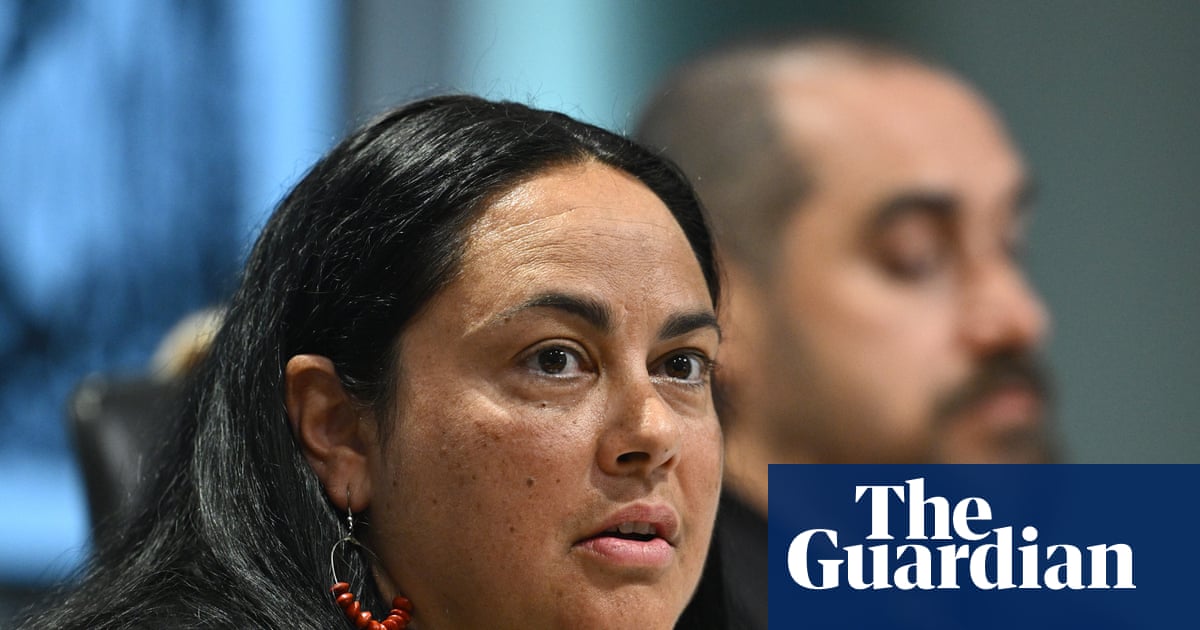Australia’s first formal treaty with traditional owners is one step closer to becoming a reality, with the Victorian government introducing a bill to parliament formalising the agreement.
The Victorian premier, Jacinta Allan, on Tuesday said she was proud to introduce the statewide treaty bill to parliament, which once passed, will pave the way for a formal apology, the introduction of Aboriginal truth-telling into the school curriculum and greater use of traditional names for natural parks and waterways.
She said Australia was an “outlier” globally, as the only country without a treaty with its Indigenous peoples. She said her government was not alone in spending “huge amounts of money seeking to close the gap” but failing.
“We know the current practices and systems that have been in place for a very long time just simply aren’t working,” Allan told reporters. “There needs to be change, and that’s what this treaty agreement and this bill will deliver.”
Ngarra Murray, the co-chair of Victoria’s First Peoples’ Assembly, said Tuesday marked “a new era”. Her co-chair, Rueben Berg, said the treaty bill would “reset the relationship” between First Peoples and the state government.
Here’s what we know about the bill and the treaty agreement.
How did we get here and why is the Victoria treaty bill groundbreaking?
The treaty is the culmination of almost 10 years of work by the Victorian Labor government, which began in 2016.
In 2018, the parliament made history when it passed a bill to establish the First Peoples’ Assembly to represent Aboriginal and Torres Strait Islander peoples in treaty discussions. The assembly has since held two elections.
In 2022, the parliament did so again when it passed a bill to set up the treaty authority – the country’s first independent body to oversee negotiations.
Treaty negotiations have been under way since late 2024, with the government and the assembly releasing updates throughout the process.
If the bill passes, it will acquit voice, treaty and truth – the three pillars of reform requested in the 2017 Uluru statement from the heart. Victoria will become the first state in the country to achieve this.
What will the new laws do?
The bill will establish the First Peoples’ Assembly as a permanent representative body to provide advice to government, under a new statutory corporation called Gellung Warl.
Gellung Warl will also include a truth-telling body, to be known as Nyerna Yoorrook Telkuna, and an accountability body, known as Nginma Ngainga Wara. The latter will ensure the government upholds its commitments under the national agreement on closing the gap.
Sign up: AU Breaking News email
In its expanded role, the assembly will be able to make representations, provide advice to the government and question ministers. Ministers and government departments, in turn, will be required to consult the assembly on laws and policies related to First Peoples. However, the assembly will not have veto powers.
It will also take on responsibility for confirming Aboriginality, take control of the government’s Aboriginal community infrastructure program, the Victorian Aboriginal honour roll and the organisation of important events, such as Naidoc Week, and establish an education institute that will provide targeted skills and leadership training to First Peoples.
Gellung Warl will be funded through a special appropriation act to be set up by parliament, with the body to receive about $70m a year once fully operational.
What does the treaty agreement include?
Once the bill passes, the government and the assembly will formally sign the treaty agreement. The 34-page agreement includes several other measures that don’t require legislative changes.
This includes a commitment to reshape the school curriculum to include truth-telling from prep to year 10, a formal apology to First Peoples in parliament and a dedicated room within Parliament House for Gellung Warl to carry out its functions. There will also be a push to increase the use of First Peoples traditional placenames, including at national and state parks, waterways and waterfalls on state land.
Will there be other Victorian treaties?
The agreement makes clear the statewide treaty isn’t a one-off agreement. Instead, it’s part of an “ongoing process”, with the state and the assembly committing to continuing discussions on “all matters affecting First Peoples”. Further statewide treaties could follow, covering policy or subject areas as well as deeper structural or systemic issues in the relationship between First Peoples and the state.
There are also traditional owner treaties, which are focused on local matters that are important to traditional owners in their specific areas. In May, the Dja Dja Wurrung traditional owner group became the first to register with the treaty authority to begin negotiations.
Will it pass and, if so, will it last?
The Coalition opposition withdrew support for the treaty process after the 2023 failure of the referendum to alter the constitution to create a federal voice to parliament, with 60% of Australians voting no. At Tuesday’s party room meeting, this position was reaffirmed.
But the government won’t need the opposition’s support for this latest bill to pass the upper house, as the Greens, the Animal Justice party and Legalise Cannabis previously told Guardian Australia they were supportive of the treaty process.
What is more unclear is what will happen to the bill if the Coalition wins the next state election in November 2026. Asked whether the party would repeal the legislation, the Coalition spokesperson for Aboriginal affairs, Melina Bath, declined to comment on Tuesday, as she hadn’t yet seen the bill.

